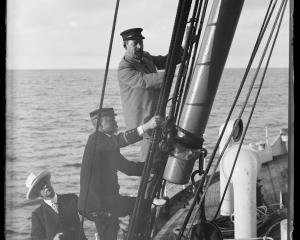
BRADFORD MANOR REST HOME CAREGIVERS
Bradford Manor Rest Home caregivers made headlines for going above and beyond the call of duty during the Covid-19 lockdown.
While most people took their work home with them, they decided they would make their Dunedin workplace home.
The nine staff members — Juanita Arthur, Michelle Donaldson, Brenda Eriepa, Allean Apolinario, and Phillipa Cameron, Peter Weatherall, Keili Amato, her daughter also Keili Amato and son Lo Amato — moved into the rest-home for six weeks to ensure the 26 dementia patients were protected from the virus.
Only three of the 12 staff members could not stay on site because they had compromised immune systems and health problems.
It meant sacrificing seeing their own families, including children for some.
They shared just two empty rooms with beds, rotating the night staff with day staff.
Manager Michelle Donaldson said at the time she could not stress enough how proud she was that her staff had decided to move, an idea they came up with themselves.
- Part 1 - Twenty for 2020: Those who showed us the way
- Part 2 - The best of 2020 battle to the top
- Part 3 - Advocacy, culture, hospitality abound
- Part 4 - Inspiration driven by a sense of community
Carer Brenda Eriepa said despite long hours and some stressful times, the team managed well.
"We really enjoyed it because we really got to know our residents.
"It opened our eyes to a lot of things."
— Molly Houseman

Survivor
MUSTAFA BOZTAS
Mustafa Boztas looked hate squarely in the eye and spoke his truth.
His powerful victim impact statement, read aloud in a courtroom the world was watching, outlined the extreme toll of the Christchurch terror attack.
Mr Boztas, of Dunedin, was a student in Christchurch in 2019. He went to Friday prayers at the Al Noor Mosque on March 19 that year, the same day Brenton Tarrant stormed the building and carried out New Zealand’s worst mass shooting.
Mr Boztas was shot in the leg during the massacre.
He made his feelings towards the terrorist clear when he read his statement in the High Court at Christchurch in August.
"You’ll be remembered but as a scared killer and nothing more," he said.
His composure and bravery throughout the sentencing was impressive.
Mr Boztas has since become an outspoken critic of racism and extremism. He also wants to pay forward the support he was given by becoming a police officer.
— Daisy Hudson

Fundraiser
MELISSA VINING
Through the hardship of losing her husband and father of her two children, Melissa Vining has been a central character involved in the establishment of the Southland Charity Hospital.
Melissa, or Missy, Vining lost her husband Blair last year to bowel cancer.
The past year involved many fundraisers and events held with the aim to raise money for the hospital which will provide services to Southland and Otago residents.
During Mr Vining’s last year alive he and his wife worked to reform New Zealand cancer care and make it equitable.
The hospital was endorsed by the Vinings, and Mrs Vining has a place on the board.
Fundraising culminated in the Buy A Brick day in July, where individuals, schools and groups donned black, red and white and purchased supporters’ bricks or plaques.
On the day, the keys of the hospital were handed over to Mrs Vining and the hospital board; the building had been donated by ILT.
Since then, she had been visiting a number of supporters involved in raising money for the hospital.
These included head shaves, sports events, wool bale donations and more.
— Laura Smith

Koha Kai founder
JANICE LEE
For Janice Lee, being the chief executive of social enterprise Koha Kai is sort of like "being a player in a game of chess".
Her work in 2020, as it has been for the past seven years, was focused on creating new and innovative employment and education opportunities for those living with disabilities.
For Lee, working for people with disabilities is about ensuring everything the team does is sustainable — so she is constantly scanning and listening-out for opportunities for the people she works for.
The "big, hairy, audacious goal" is about influencing and redefining the disability system, she said.
A third of the Koha Kai workforce is made up of people with disabilities and 48% who identified as Maori, and by January 2021, every single one of them will be earning a living wage or more.
"This is where the satisfaction in my job sits. Anything else which has happened along the way has been a by-product of our core purpose — our Kaupapa."
All-in-all, it was about encouraging those with disabilities to live their best, independent, rewarding and satisfying life.
— Abbey Palmer














